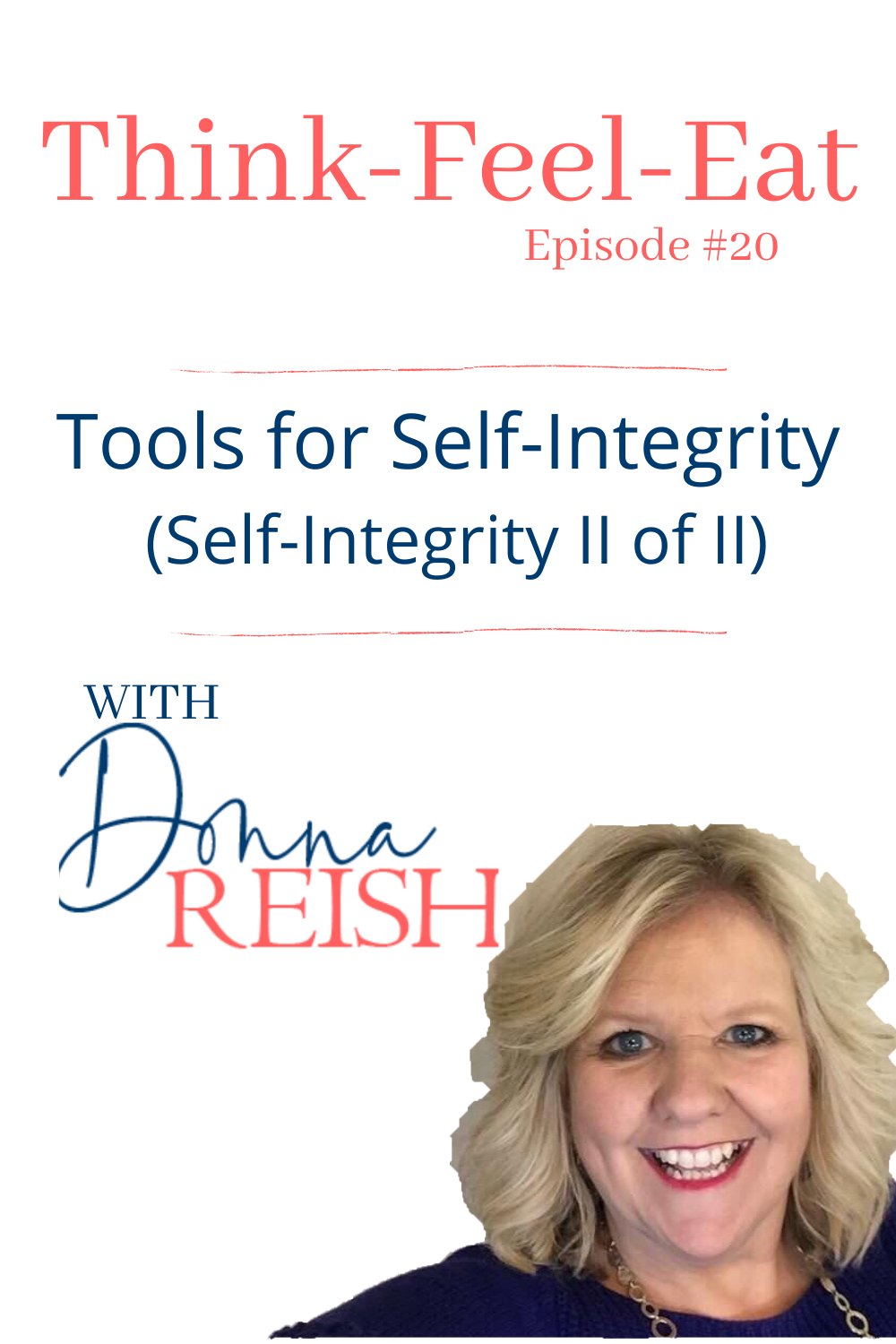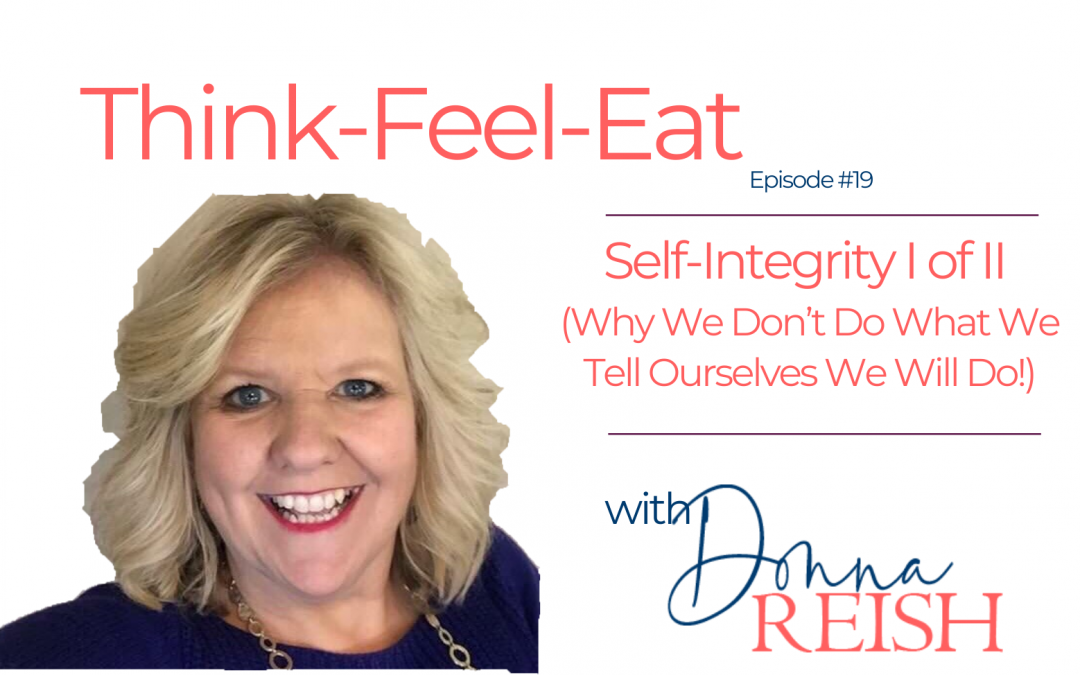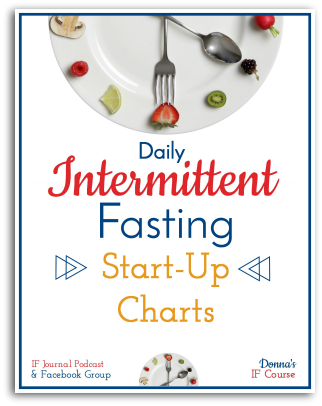
Think-Feel-Eat #20: Tools for Self-Integrity (Part II of II)
Hi! I’m Donna Reish, IF teacher, weight loss coach, blogger, and half of “The Minus 220 Pound Pair” as my husband and I have lost over 220 pounds together (160 of that in the past couple of years through the Weight Loss Lifestyle habits and strategies I teach!).
Self-Integrity is at the basis of every change we want in our lives—physically, mentally, emotionally, relationally, spiritually, productively….it is the core to why we don’t do what we say we will do—and why we do, do what we say we will do!
Most of us call self-integrity by another name: willpower. We think we just don’t have the willpower to do what we tell ourselves we will do.
And there’s some truth to the fact that we often don’t have the willpower to carry out what we say we will do….but willpower isn’t the only cause of our self-integrity lack.
Last week, in Episode #19 of Think-Feel-Eat, I described a few enemies of self-integrity (what we make past failures mean; perfectionism; not breaking things down {habit formation skills lacking}; relying on willpower; and not deciding ahead of time).
(For more understanding of willpower, see my Weight Loss Lifestyle broadcasts #60 and #61.)
In this week’s episode, I bring good news! Tools!
Tools we can use in our lives and skills we can develop to become the kind of person is filled with self-integrity—the kind of person who does what we say we will do. Yay us!
These tools counteract the enemies of self-integrity and put us on the path to food control, business growth, daily disciplines, relationship nurturing, and much more.
I present a few general tools like Thought Work, sleep, automaticity, and craving reducers.
Then I have created a derivative of BJ Fogg’s (Tiny Habits) ABC’s of Habit Formation by combining his ABC, my experience with attachments and minimum baselines through homeschooling for thirty-two years, and an early teacher (Gregg Harris) in the homeschooling world’s Attachment Approach (Fogg calls this Anchor). This tool works—and I am so excited to present it to you!
20 Self Integrity Part II of II (Tools for Self Integrity—Including the ABC Approach!)
A. Review Why We Don’t Do What We Tell Ourselves We Will Do
1. Past failures—what we make them mean
2. Perfectionism
3. Not breaking things down (habit formation)
4. Relying on willpower (Weight Loss Lifestyle 60 and 61)
5. Not deciding ahead of time (today’s tools will help this!)
B. Misc. Tools That Will Make a Difference!
1. Thoughts (Perfect Storm #7)
2. Sleep can refill willpower stores (Weight Loss Lifestyle 42)
3. Automaticity
a. Schedules
b. Repeating same foods
4. Reducing cravings
a. TFE 7, 8, and 9
b. Extend the time between super seductive foods
C. The ABC’s of Self-Integrity
1. Three little steps that the above enemies of self-integrity often diminish
2. Questions/ABC aspect from BJ Fogg Tiny Habits book
3. My introduction to the first two steps from Gregg Harris in The Advanced Homeschooling Workshop
4. The C—Celebration
a. Many used to say that this was actually “Consequences”—the outcome of doing A and B.
b. Researchers now believe that it isn’t the outcome that drives us to create habits and to stay in self integrity
c. We are driven to change behaviors through Feelings
i. Celebration (step three) intensifies and emphasizes positive feelings related to our self integrity
ii. Celebration gives us a built in opportunity to feel the feeling that will help us to continue to build that habit/be in self integrity
D. Get More Help!
1. The Perfect Storm of Weight Loss teaches the steps to create your own protocol and bring together all aspects of weight loss
2. Willpower Part I and II
3. Intermittentfastingcourse.com
4. Sign up for a free consult call to see if weigh/time management/life coaching with me would help you meet your goals! Donnareish.com/coachingpackages
5. Pick-a-Protocol 16, 17, and 18


















